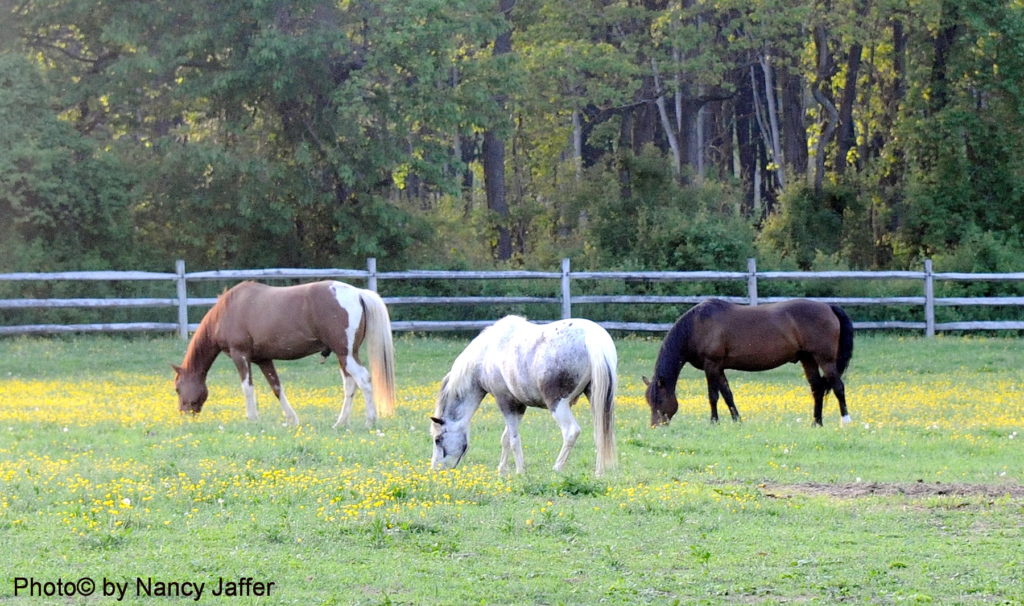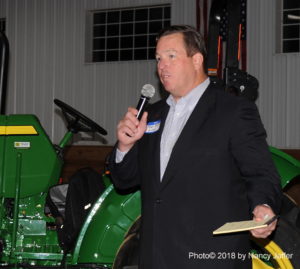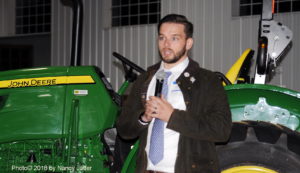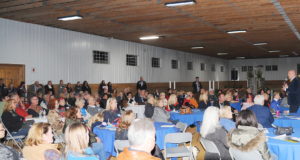By Nancy Jaffer
October 25, 2108
It seems like common sense to acknowledge that New Jersey’s horse industry is part of the agricultural community, but everyone doesn’t see it that way.
To some who raise crops, “Horse people are not farmers. That’s the mentality,” noted equine veterinarian Brendan Furlong, recalling a comment from an acquaintance whose business is growing vegetables. And that farmer isn’t alone in his viewpoint.
In an attempt to change the mindset, members of the horse industry got together with farmers this week at the Desiderio family’s Tranquillity Farm in Chester during the “Equine is Agriculture” gathering.
Explaining the effort to have representatives of both sectors at the meeting, Brendan said, “We’re trying to integrate them.”

Wouldn’t you call this a farm scene? (Photo©by Nancy Jaffer)
Such a move seems long overdue, considering their shared concerns about such issues as farm labor, farmland preservation, waste management and the pressures of development, as well as the often-burdensome regulations that go with the territory in the country’s most densely populated state.
Brendan’s Oldwick-based practice, B.W. Furlong Associates, partnered with the New Jersey Farm Bureau, Califon Animal Hospital (one of its owners, Mary Beth Hamorski, is a past president of the N.J. Association of Equine Practitioners) and John Deere/Central Jersey Equipment on the program. It drew 135 people to the show stable’s indoor arena for the lively session.
Brendan’s son, Adam, a vice president of both the Furlong practice and the Horse Park of New Jersey, said that as a member of the New Jersey Agricultural Society’s Leadership Development Program, he learned, “There was a sense the equine community was separate from the agricultural community.”
He put in a call to discuss the subject with Somerset County hay farmer Ryck Suydam, the farm bureau’s president, who is well aware of the horse industry’s importance to larger New Jersey agricultural picture.

Ryck Suydam, president of the N.J. Farm Bureau. (Photo©2018 by Nancy Jaffer)
“Our interests are perfectly aligned with each other,” said Ryck. “What is good for the hay farmer is good for the horse owner and vice versa.”
The two began planning for the event about a year ago. Ryck said this is the first in a series of such get-togethers, with another already requested for Gloucester County.
Such meetings facilitate what he called “old school networking,” with people getting together beforehand and afterwards to share their points of view.
“It’s better face-to-face that it is in an email or a tweet,” Ryck continued. The last time the Farm Bureau did something similar, when the subject was changes in farmland assessment, three such meetings were planned. “We wound up doing 11,” he said.
The question is why there has been a lack of cohesiveness between equestrian interests and non-equine farmers in the Garden State, where the horse is the state animal.
“I don’t think either side is to blame,” observed Adam.
“Equine is very definitely a big component of agriculture,” he continued, explaining organizers of the event want to “create a more singular voice. If we look out for interests of the equine community, it’s going to go hand-in-hand with the agricultural community. Likewise, we should support farm legislation in general.

Adam Furlong speaks at the meeeting. (Photo©2018 by Nancy Jaffer)
“If commodities go up in price because land values skyrocket, or it becomes too inefficient to farm here, it will have a negative impact on the equine community in New Jersey. People are moving out; it spirals.”
Citing the Horse Park’s struggle to obtain more funding, Adam observed, “the only way get it is if more revenue is counted in through agriculture and/or equine and showing the state this is a revenue-producing industry for them.”
Speakers included Brian Smith, chief of legal affairs for the State Agriculture Development Committee. He discussed the right-to-farm act, which offers protection to agricultural operations. Its website is worth a look at http:nj.gov/agriculture/sadc/rtfprogram, particularly for those whose operations are having trouble with neighbors taking issue with farming in their area.

There was a good turnout at the meeting. (Photo©2018 by Nancy Jaffer)
Ed Wengryn, a farm bureau research associate, offered welcome news that the much-hated sales tax on boarding horses, which went into effect in 2006, may soon be a thing of the past. A bill pending in the state Legislature is designed to repeal it, but a provision to make it retroactive didn’t fly because it would be too costly and complicated to refund the money collected over the last 12 years. Equestrian interests have been trying for more than five years to kill the fee, which is a “storage” tax, similar to what you would pay to keep your sofa and bookshelves at a facility somewhere.
“Horse are livestock, they are not furniture,” Ed pointed out. The bill, which has been passed by the Assembly, will go through the Senate budget process and from there to a floor vote.
Brendan gave an equine health update, discussing the importance of turnout and ways to feed horses more naturally (less grain, more forage), cutting down on the chances of colic in the process.
Organizers of the meeting are hoping more horse people will join the Farm Bureau and help its efforts with their support. The cost is $150 for a regular membership, $60 for an associate membership and a $210 corporate membership. Fine out more at https://njfb.org/join/.
The bureau offers information on current farm issues through a weekly newsletter, a quarterly publication and its website. Among many other initiatives its efforts include working with legislators, providing leadership development for young farmers and focusing on immigration reform to ensure a stable and affordable source of farm labor.
“I hope the Farm Bureau increases their membership out of this,” said Adam.
“I want the farming community to think about changing the mindset, being supportive of each other and really acknowledging how much our interests are aligned.”



